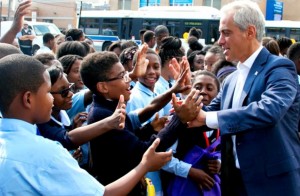Emanuel acknowledges need to change
Kevin Beese — April 13, 2015
Chicago Mayor Rahm Emanuel will head into a second term facing a less congenial City Council, a host of financial and civic issues, and the knowledge that many residents balked at his decisions and leadership style in his first go-around.
Emanuel acknowledges need to change style.
Will Rahm 2.0 be the kinder, gentler mayor of Chicago that he promised in those slick television ads or will it be the exact same product just in a new box?
Chicago Mayor Rahm Emanuel will head into a second term facing a less congenial City Council, a host of financial and civic issues, and the knowledge that many residents balked at his decisions and leadership style in his first go-around.
Whether he works more with people as his mea culpa ads promised or continues with the hardball politics that served him well as chief of staff in the Clinton and Obama administrations remains to be seen.
“The mayor now has a chance to reverse some of the damage felt by neighborhoods in Chicago,” said Randi Weingarten, president of the American Federation of Teachers. “We urge him to start by reinvesting in the communities he unnecessarily gutted by closing schools he could have chosen to fix and make the hub of neighborhoods.”
Teachers and residents in areas with shuttered schools were a big reason that Emanuel faced six more weeks of campaigning, the first mayor in Chicago history forced into a runoff election.
Cook County Commissioner Jesus “Chuy” Garcia faced Emanuel in last week’s runoff election, but couldn’t match the money Emanuel poured into the campaign.
Emanuel captured 56 percent of Chicago’s mayoral vote in the April 7 election.
Weingarten said the mayor needs to remember voters forced him into a runoff.
“Runoffs carry a special message for re-elected leaders,” the AFT president said. “Voters are willing to give them a second chance. Mayor Emanuel was given that chance by an electorate that is willing to believe his humbled promise that he ‘can do better,’ but does not want him to forget that education policies have to change.”
Weingarten said Emanuel would be wise to get teachers on his side rather than antagonizing them.
“We urge him to start working with, rather than fighting with, the educators of this great city,” Weingarten said. “Across the nation, cities are increasingly returning to their role as this country’s economic engines. In Chicago and elsewhere, we must collaborate to compete, for our cities, our schools, our economy and our children to thrive.”
Emanuel did lay the groundwork for a return to his tough leadership style, when needed, in his victory speech.
“In an era of hard choice, I can’t promise that everyone will be pleased with every decision,” he said.
He did, however, acknowledge voters’ unhappiness with his bullish style.
“Chicago, I hear you,” Emanuel said. “I’m proud of what we have accomplished, but I understand the challenges that we face will require me to approach them differently.”
Garcia believes his campaign showed that people are hungry for change and that cities need to work for all residents.
“I’m confident that the message we sent will resonate across Chicago and across the nation,” Garcia said. “We will continue to organize to make our city work for everyone. We will continue to fight for working people and for families.”



